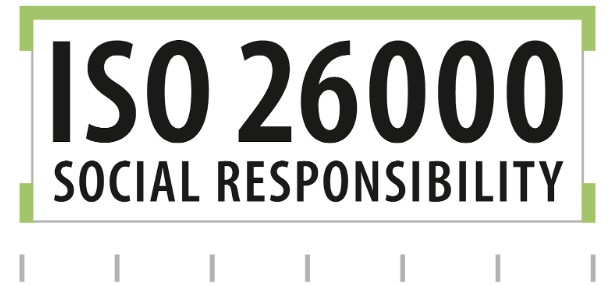In today’s increasingly socially conscious world, organisations must demonstrate their commitment to sustainability, ethical practices, and governance to gain a competitive edge and enhance their reputation. One of the most effective ways to show that your business is committed to these values is by achieving ISO 26000 certification. This certification provides organisations with a recognised framework to integrate social responsibility into their business operations. In this article, we will explore how ISO 26000 certification can help boost your Environmental, Social, and Governance (ESG) reputation and why it should be an essential component of your corporate strategy.
What is ISO 26000 Certification?
ISO 26000 is an international standard that provides guidance on social responsibility. Unlike other ISO standards, which are certifiable, ISO 26000 is a guidance document and does not require certification in the traditional sense. However, its implementation in an organisation demonstrates a commitment to corporate social responsibility (CSR) and a focus on sustainable business practices.
The ISO 26000 certification outlines seven core principles of social responsibility:
- Accountability: Organisations should take responsibility for their impact on society and the environment.
- Transparency: Businesses should be open about their actions and decisions.
- Ethical Behavior: Organisations must act in an ethical and fair manner, promoting fairness, honesty, and integrity.
- Respect for Stakeholder Interests: Organisations should consider the needs and interests of all stakeholders, including customers, employees, suppliers, and the community.
- Respect for the Rule of Law: Complying with legal standards is crucial.
- Respect for International Norms of Behavior: Organisations should adhere to recognised global standards.
- Respect for Human Rights: Ensuring the protection of fundamental human rights across all business activities.
These principles help businesses create strategies that align with global expectations of ethical behaviour and corporate responsibility.
Why is ISO 26000 Certification Important for Your ESG Reputation?
1. Demonstrates Commitment to Social Responsibility
The ISO 26000 certification serves as a clear indicator of a company’s commitment to social responsibility. By adhering to the principles outlined in the standard, businesses can show that they are actively working toward sustainability and the welfare of their communities. This commitment is crucial in building trust with consumers and stakeholders who are increasingly prioritising ethical business practices.
2. Strengthens Transparency and Accountability
Transparency is a key pillar of both ISO 26000 certification and the ESG framework. The certification requires organisations to report on their social and environmental impact openly and truthfully. By maintaining transparency and holding themselves accountable, companies are able to build stronger relationships with stakeholders and demonstrate their dedication to making a positive impact.
3. Enhances Brand Reputation
Organisations that pursue ISO 26000 certification are perceived as forward-thinking businesses that care about their social and environmental footprint. In an era where sustainability is a growing concern, having this certification can differentiate your brand in a competitive market. Whether you are looking to attract customers, investors, or top talent, demonstrating your commitment to social responsibility through certification will enhance your reputation.
4. Improves Risk Management
ISO 26000 certification helps businesses identify and manage risks related to social responsibility, including environmental impacts, human rights issues, and labour practices. By addressing these areas proactively, businesses can avoid potential legal and reputational risks. This is particularly important in a globalised economy, where companies are increasingly held accountable for their supply chains and operations across borders.
5. Aligns with Global ESG Standards
The ISO 26000 certification is aligned with other globally recognised ESG standards, such as the UN Global Compact and the Global Reporting Initiative (GRI). By adopting ISO 26000, businesses can ensure that their strategies are in line with international best practices for sustainability and social responsibility. This alignment helps create a consistent approach to ESG issues, enabling companies to meet both local and international expectations.
How to Achieve ISO 26000 Certification
1. Conduct an ESG Assessment
Before pursuing ISO 26000 certification, businesses should conduct a thorough assessment of their current practices in areas such as environmental impact, social responsibility, and governance. This assessment will provide a baseline for improvement and allow companies to identify key areas where changes are needed.
2. Develop an Action Plan
After identifying the areas for improvement, the next step is to create an action plan that aligns with the principles of ISO 26000. This plan should outline specific steps the company will take to integrate social responsibility into its operations, such as improving waste management, adopting fair labor practices, and enhancing transparency in reporting.
3. Engage Stakeholders
Stakeholder engagement is a vital component of ISO 26000 certification. Involve key stakeholders, including employees, suppliers, and customers, in the process. This ensures that the actions taken are relevant and address the concerns and needs of those who are most affected by the business’s operations.
4. Monitor and Report Progress
To maintain the integrity of the ISO 26000 certification process, organisations must continuously monitor their progress and report on their activities. Regular reporting ensures that the company is on track to meet its ESG goals and provides transparency to stakeholders about the company’s impact..
Conclusion
Achieving ISO 26000 certification is a powerful way to boost your company’s ESG reputation. By aligning your business practices with internationally recognised principles of social responsibility, you demonstrate a commitment to ethical practices, sustainability, and good governance. This certification can help attract customers, build stronger stakeholder relationships, and mitigate risks, ultimately driving long-term success.


